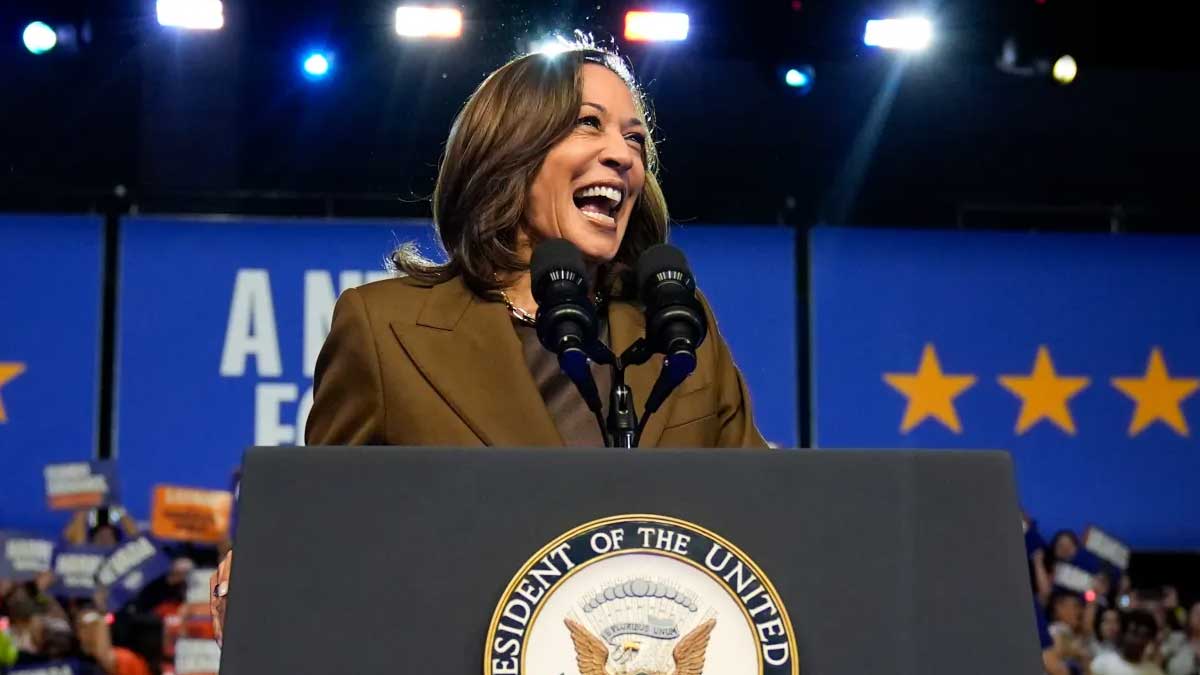- Home
- Billionaires
- Investing Newsletters
- 193CC 1000
- Article Layout 2
- Article Layout 3
- Article Layout 4
- Article Layout 5
- Article Layout 6
- Article Layout 7
- Article Layout 8
- Article Layout 9
- Article Layout 10
- Article Layout 11
- Article Layout 12
- Article Layout 13
- Article Layout 14
- Article Sidebar
- Post Format
- pages
- Archive Layouts
- Post Gallery
- Post Video Background
- Post Review
- Sponsored Post
- Leadership
- Business
- Money
- Small Business
- Innovation
- Shop
Recent Posts
Harris Leads in Nevada, Faces Latino Support Challenges

In Nevada, a key battleground state in the 2024 election, Vice President Kamala Harris currently leads former President Donald Trump in a close race. Harris holds a narrow 51% to 47% advantage according to a recent Cooperative Election Study survey conducted among likely voters in Nevada. This survey, a large-scale national poll backed by various universities, indicates that Harris is maintaining a slight edge with Nevada’s electorate, though her lead is fragile due to slipping support from Latino voters, a demographic critical to Democratic success in the state. The survey polled 933 respondents, giving Harris a small but significant lead over Trump.
Other recent polling data reflect the competitiveness of the Nevada race. A Bloomberg/Morning Consult poll released on Wednesday reported an almost tied race, with Harris narrowly leading Trump by a slim margin of 48.8% to 48.3% among likely Nevada voters. With a margin of error of five points, the Bloomberg survey essentially places Harris and Trump in a dead heat in the state. Adding to the mixed polling landscape, a CNN/SSRS poll released on Tuesday showed Trump slightly ahead with a 48% to 47% lead. This CNN poll, with a margin of error of 4.6 points, highlights the potential for either candidate to sway undecided voters and clinch a win in this tightly contested state. Additionally, an AARP survey from October 22 found Harris trailing Trump by a point, 47% to 46%, within a four-point margin of error, while a Wall Street Journal poll revealed a wider gap, showing Trump with a five-point lead over Harris.
With these variations, FiveThirtyEight’s weighted polling average, which accounts for the differing sample sizes and methodologies among various polls, gives Harris a slim 0.1-point edge in Nevada. This razor-thin advantage emphasizes just how tight the race is in Nevada, the smallest swing state with six electoral votes. Nevada has consistently voted for Democratic presidential candidates since 2008, and in 2020, President Joe Biden won the state by 2.4 points against Trump. This historical Democratic advantage, however, may not be as robust this time around, particularly given Harris’ struggles to maintain strong support among Latino voters.
Latino voters have long been a cornerstone of Democratic support in Nevada and throughout the Southwest, but recent polling indicates a shift in allegiance. According to a September NBC News/Telemundo/CNBC poll, Latino support for the Democratic Party has waned, dropping from 56% in 2016 to 49% in 2024. This decline could prove challenging for Harris, especially in Nevada, where Latinos comprise approximately 30% of the population. Notably, Harris has struggled to retain support from Latino men in particular, with CNN exit polls from 2020 showing Biden winning Latino voters in Nevada by a substantial margin of 61% to 35%. However, a more recent October poll by USA Today/Suffolk University indicates that Harris now leads Trump among Latino voters by a smaller 56% to 40% margin, suggesting an erosion of support among this critical voting bloc.
Within the Latino community, Harris faces particular difficulty among younger male voters. The USA Today/Suffolk poll reveals that 53% of Latino men aged 18-34 in Nevada support Trump, while just 40% back Harris. Similarly, among Latino men aged 35-49, 53% favor Trump compared to 39% for Harris. These numbers underscore a significant gender gap within the Latino electorate that could impact Harris’ overall performance in Nevada. Issues like immigration and inflation top the list of concerns for Latino voters in the state, with a USA Today/Suffolk poll showing that 37% of Latino respondents prioritize inflation as their primary concern, while 17% cite immigration as their top issue. Harris’ campaign has attempted to address these concerns, but it remains to be seen if these efforts will yield increased support among Latino men.
In response to these challenges, Harris’ campaign has launched targeted outreach efforts aimed at bolstering support among Latino men in Nevada as well as in other battleground states like Arizona and Pennsylvania. This month, Harris’ team initiated a “Hombres con Harris” tour, a last-minute push aimed at connecting with Hispanic men through a series of events featuring members of the Congressional Hispanic Caucus, including Representative Ruben Gallego of Arizona. The campaign strategy includes engaging with Latino men at various community-centered venues like sports bars, restaurants, union halls, and Latino-owned small businesses. Harris’ campaign team hopes these stops will provide an opportunity to address key issues and win over Latino men whose support could be crucial to winning Nevada.
Nevada’s significance as a swing state cannot be understated. Its relatively small number of electoral votes—six—makes it an essential state for both parties as they look to secure victory in a highly polarized national landscape. With only a narrow lead in the state and with Latino voters potentially splitting their support, Harris will need to shore up support among Latinos if she hopes to maintain her edge. Polls suggest that Trump’s stance on issues like immigration and the economy has resonated with some segments of the Latino community, particularly younger men. In contrast, Harris and her Democratic colleagues have emphasized policies aimed at addressing economic inequality, expanding healthcare access, and protecting immigrant rights. However, whether these issues will sway enough Latino voters remains uncertain.
The race in Nevada is emblematic of broader trends impacting Latino voters nationwide. While Democrats have traditionally counted on strong Latino support, recent polling suggests a realignment may be underway. Factors such as inflation, housing costs, and immigration policy have emerged as focal points for Latino voters, and Republicans have made inroads by speaking directly to these concerns. For Harris, securing Nevada’s electoral votes may hinge on her ability to reconnect with Latino voters who feel disillusioned or disconnected from the Democratic Party’s current platform. Should Harris succeed in addressing their concerns, she may hold on to the narrow lead indicated by the FiveThirtyEight polling average.
In Nevada, as in many other swing states, the 2024 election may be decided by small shifts within key demographics like Latino men. Harris’ slim lead in the Cooperative Election Study survey and her efforts to engage Latino voters highlight the importance of targeted, community-centered outreach in competitive states. Whether Harris can retain or even expand her support among Nevada’s Latino community will be crucial as both campaigns approach the final stretch. For now, polls show Harris leading by a thin margin, but the state’s six electoral votes remain firmly up for grabs in a race that could swing in either direction as November approaches.
Recent Posts
Categories
- 193cc Digital Assets2
- 5G1
- Aerospace & Defense46
- AI37
- Arts3
- Banking & Insurance11
- Big Data3
- Billionaires449
- Boats & Planes1
- Business328
- Careers13
- Cars & Bikes76
- CEO Network1
- CFO Network17
- CHRO Network1
- CIO Network1
- Cloud10
- CMO Network18
- Commercial Real Estate7
- Consultant1
- Consumer Tech180
- CxO1
- Cybersecurity68
- Dining1
- Diversity, Equity & Inclusion4
- Education7
- Energy8
- Enterprise Tech29
- Events11
- Fintech1
- Food & Drink2
- Franchises1
- Freelance1
- Future Of Work2
- Games141
- GIG1
- Healthcare78
- Hollywood & Entertainment186
- Houses1
- Innovation42
- Investing2
- Investing Newsletters4
- Leadership65
- Lifestyle11
- Manufacturing1
- Markets20
- Media193
- Mobile phone1
- Money13
- Personal Finance2
- Policy567
- Real Estate1
- Research6
- Retail1
- Retirement1
- Small Business1
- SportsMoney33
- Style & Beauty1
- Success Income1
- Taxes2
- Travel10
- Uncategorized8
- Vices1
- Watches & Jewelry2
- world's billionaires418
Related Articles
Trump Moves $4B Stake in Truth Social Parent, Stock Drops 6%
Donald Trump recently transferred his 57% stake in Trump Media & Technology...
By 193cc Agency CouncilDecember 20, 2024House Rejects Trump-Backed Funding Bill, Shutdown Looms
The U.S. House of Representatives rejected a new government funding bill on...
By 193cc Agency CouncilDecember 20, 2024Trump Named Time’s Person of the Year for Second Time
On Thursday, Time magazine honored Donald Trump as its “Person of the...
By 193cc Agency CouncilDecember 12, 2024Meta Donates $1 Million to Trump’s Inaugural Fund
Meta, the parent company of Facebook and Instagram, has confirmed a $1...
By 193cc Agency CouncilDecember 12, 2024















Leave a comment